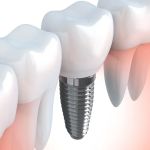How to Treat a Swollen Gum: Effective Remedies and Tips
Swollen gums can be a frustrating and painful condition that many individuals experience at some point in their lives. Whether it’s due to poor oral hygiene, a gum infection, or even a dental procedure, dealing with swollen gums can significantly impact your day-to-day life. Understanding the causes, treatments, and prevention techniques for swollen gums is essential for maintaining good oral health. In this article, we will explore the best ways to treat swollen gums and offer practical tips for preventing them in the future.
1. Understanding the Causes of Swollen Gums
Before diving into the treatment options for swollen gums, it's important to understand the underlying causes. Swollen gums can be triggered by various factors, including poor oral hygiene, gum disease (gingivitis or periodontitis), hormonal changes, infections, and even certain medications. One of the most common reasons for swollen gums is plaque buildup along the gumline, which leads to inflammation and irritation.
Other causes of swollen gums can include:
- Teething: For children, teething can cause swollen gums as new teeth emerge.
- Infections: Oral infections like abscesses or a tooth infection can also lead to swollen gums.
- Pregnancy: Hormonal changes during pregnancy can make gums more sensitive and prone to swelling.
- Vitamin Deficiencies: Lack of certain vitamins, especially vitamin C, can contribute to swollen and bleeding gums.
- Braces or Dental Work: New braces or dental treatments may cause temporary gum irritation and swelling.
Once the cause of your swollen gums is identified, the appropriate treatment plan can be implemented. It's essential to consult a dental professional for an accurate diagnosis and to ensure that any underlying health issues are addressed.
2. Home Remedies for Swollen Gums
For mild cases of swollen gums, there are several home remedies you can try before seeking professional treatment. These remedies can help alleviate pain and reduce inflammation:
- Salt Water Rinse: Rinsing your mouth with warm salt water is a natural way to reduce swelling and kill bacteria. Mix a teaspoon of salt in a glass of warm water and swish it around your mouth for 30 seconds. This can help clean your gums and reduce irritation.
- Cold Compress: Applying a cold compress to the outside of your cheek near the swollen gums can help numb the pain and reduce swelling. Hold the compress for 10-15 minutes several times a day.
- Hydrogen Peroxide Rinse: A diluted hydrogen peroxide rinse can help clean your mouth and reduce inflammation. Mix equal parts hydrogen peroxide and water, and use it as a mouth rinse. Be cautious not to swallow the mixture.
- Essential Oils: Essential oils like tea tree oil and peppermint oil have natural antibacterial properties. Dilute a few drops in water and use it to rinse your mouth, or apply a diluted mixture directly to the swollen gums using a cotton swab.
- Aloe Vera: Aloe vera has soothing and anti-inflammatory properties that can help reduce gum swelling. You can apply aloe vera gel directly to the swollen gums to help alleviate discomfort.
While these remedies can provide temporary relief, they should not replace professional dental treatment, especially if the swelling persists or worsens. It's essential to visit a dentist if symptoms continue.
3. When to See a Dentist for Swollen Gums
If your swollen gums do not improve with home treatments, it’s time to seek professional dental care. A dentist can assess the severity of your condition and provide a treatment plan tailored to your specific needs. Here are some signs that indicate you should see a dentist:
- Persistent Swelling: If your swollen gums do not improve after a few days of home treatment, or if the swelling worsens, it may indicate a more serious condition.
- Severe Pain or Sensitivity: Intense pain or sensitivity, especially when chewing or brushing, may indicate an infection or more advanced gum disease.
- Bleeding Gums: If your gums are bleeding frequently, this may indicate gingivitis or periodontitis, which require professional treatment.
- Fever: If you have a fever along with swollen gums, this could be a sign of an infection that requires immediate medical attention.
At the dentist's office, the treatment options for swollen gums may include deep cleaning (scaling and root planing) to remove plaque and tartar buildup, prescription antibiotics for infections, or even gum surgery in severe cases of gum disease.
4. Preventing Swollen Gums: Tips for Healthy Gums
Preventing swollen gums is just as important as treating them. By maintaining good oral hygiene and making a few lifestyle adjustments, you can significantly reduce the risk of gum problems:
- Brush and Floss Regularly: Brush your teeth at least twice a day with fluoride toothpaste, and floss daily to remove plaque and food particles from between your teeth and along the gumline.
- Use Antiseptic Mouthwash: Rinsing with an antibacterial mouthwash can help reduce plaque buildup and kill bacteria in your mouth, reducing the likelihood of gum disease.
- Eat a Balanced Diet: Eating foods rich in vitamins, especially vitamin C, can help keep your gums healthy. Avoid sugary snacks that can lead to plaque buildup.
- Quit Smoking: Smoking increases your risk of gum disease and impairs your body's ability to fight infections. Quitting smoking can improve your oral health and reduce gum issues.
- Visit Your Dentist Regularly: Regular dental checkups (every 6 months) allow your dentist to catch early signs of gum disease and other oral health issues before they become serious.
By following these tips, you can maintain healthy gums and avoid swelling or inflammation in the future.
5. Conclusion: Taking Care of Your Gums
Swollen gums are a common issue, but with the right treatment, they can be easily managed and prevented. Start by practicing good oral hygiene at home, using natural remedies, and knowing when to seek professional dental care. If your swollen gums are caused by an underlying condition, such as gum disease or an infection, your dentist will provide the necessary treatments to restore your gum health.
If you’re looking for more dental tips or products to support your gum health, visit Dentistry Toothtruth for expert advice and a variety of high-quality oral care products. Taking proactive steps today can help ensure that your gums remain healthy and free from swelling in the future.
SEO Title: How to Treat Swollen Gums: Effective Remedies and Prevention TipsSEO Keywords: swollen gums, treat swollen gums, gum disease, home remedies for swollen gums, prevent swollen gumsSEO Description: Learn how to treat swollen gums with natural remedies, when to visit a dentist, and tips for maintaining healthy gums. Improve your gum health with expert advice.






 Calder Dental4.0 (5 review)
Calder Dental4.0 (5 review) Dental Ben's4.0 (171 review)
Dental Ben's4.0 (171 review) Northland Family Dentistry4.0 (111 review)
Northland Family Dentistry4.0 (111 review) Sheats Endodontic Group4.0 (148 review)
Sheats Endodontic Group4.0 (148 review) Ford Signature Dentistry4.0 (300 review)
Ford Signature Dentistry4.0 (300 review) Prosthodontics of Madison - Kendra Schaefer, DMD & Christine Roenitz, DMD4.0 (25 review)
Prosthodontics of Madison - Kendra Schaefer, DMD & Christine Roenitz, DMD4.0 (25 review) The Importance of Oral Health Education During Pregnancy for a Healthy Pregnancy
The Importance of Oral Health Education During Pregnancy for a Healthy Pregnancy Best Tips for Brushing Your Teeth Properly for Healthy Gums: Essential Techniques for Oral Health
Best Tips for Brushing Your Teeth Properly for Healthy Gums: Essential Techniques for Oral Health Why Skipping Dental Checkups Can Lead to Bigger Oral Health Problems
Why Skipping Dental Checkups Can Lead to Bigger Oral Health Problems Advantages of Porcelain Dental Restorations
Advantages of Porcelain Dental Restorations How Can Diabetes Cause Tooth and Gum Problems? Preventing and Managing Oral Health Issues
How Can Diabetes Cause Tooth and Gum Problems? Preventing and Managing Oral Health Issues Healthy Habits for Promoting Good Oral Health and Hygiene: Tips for a Healthy Smile
Healthy Habits for Promoting Good Oral Health and Hygiene: Tips for a Healthy Smile